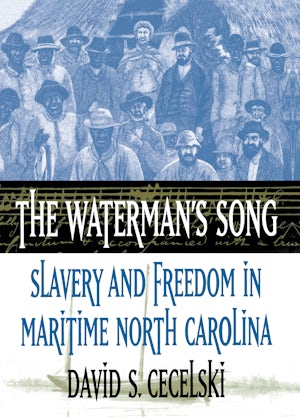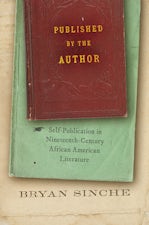The Waterman's Song
Slavery and Freedom in Maritime North Carolina
By David S. Cecelski
324 pp., 6 x 9, 62 illus., 1 map, notes, index
-
Paperback ISBN: 978-0-8078-4972-9
Published: October 2001 -
E-book EPUB ISBN: 978-0-8078-6972-7
Published: January 2012 -
E-book PDF ISBN: 979-8-8908-7244-9
Published: January 2012
Buy this Book
- Paperback $42.50
- E-Book $29.99
For Professors:
Free E-Exam Copies
Awards & distinctions
2002 Mayflower Society Award for Nonfiction, North Carolina Literary and Historical Association
A 2002 Choice Outstanding Academic Title
2001 Clarendon Cup, Lower Cape Fear Historical Society
2002 North Carolina Wildlife Federation Governor's Achievement Award
Black maritime laborers played an essential role in local abolitionist activity, slave insurrections, and other antislavery activism. They also boatlifted thousands of slaves to freedom during the Civil War. But most important, Cecelski says, they carried an insurgent, democratic vision born in the maritime districts of the slave South into the political maelstrom of the Civil War and Reconstruction.
About the Author
David S. Cecelski is an independent scholar living in Durham, North Carolina. A native of the North Carolina coast, he is author of several books, including Along Freedom Road: Hyde County, North Carolina, and the Fate of Black Schools in the South, and coeditor of Democracy Betrayed: The Wilmington Race Riot of 1898 and Its Legacy.
For more information about David S. Cecelski, visit
the
Author
Page.
Reviews
"A fine book, refreshing in its scope even as it attends wonderfully to the details of local life. . . . A careful, persuasive study, one that will be immensely helpful to those seeking to understand both the diversity of southern slavery and the ways in which slaves embraced, shaped, and used a militant political culture."--Journal of American History
"Celebrating North Carolina maritime slaves' insurgent, democratic ethos, Cecelski illustrates the variety of experiences under slavery with power and precision. His book ranks among the best of the new slavery studies."--Choice
"Cecelski has produced the first major study of slavery on the North Carolina coast."--Carolina Country
"A fine study of African American history that joins a growing chorus describing the complexity and variety of life under slavery. . . . Cecelski has recovered a different sort of slave society and a different sort of maritime society, and readers will profit from learning about both."--William and Mary Quarterly
"By uncovering and interpreting deep structures of meaning inlayed in the African American experience of North Carolina's maritime past David Cecelski has enriched immeasurably our sense of coastal North Carolina. . . . Elegant."--Southern Cultures
"This lively, deeply researched account traces three centuries of black watermen's experience on the North Carolina coast. . . . Cecelski shows a sure and sensitive touch in depicting the experience of life within the backwater communities."--Sea History




